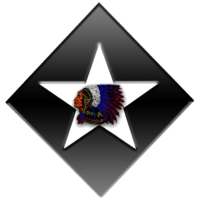6th Marine Regiment (United States)
| 6th Marine Regiment | |
|---|---|

6th Marines insignia
|
|
| Active | 1917 – 19, 1921 – 25, 1927 – 29, 1934 – 47, 1947 – 49, 1949 – present |
| Country |
|
| Branch |
|
| Type | Infantry regiment |
| Part of |
2nd Marine Division II Marine Expeditionary Force |
| Garrison/HQ | MCB Camp Lejeune |
| Nickname(s) | "Fighting 6th Marines" |
| Motto(s) | Keep Moving |
| Engagements |
World War I World War II |
| Commanders | |
| Current commander |
Col Matthew S. Reid |
| Notable commanders |
Leo D. Hermle Gilder D. Jackson Jr. Gregon A. Williams Russell H. Sutton Lawrence H. Livingston Robert Neller Austin Shofner |
|
|
World War I
World War II
Operation Desert Storm
War on Terror
The 6th Marine Regiment (also referred to as "6th Marines") is an infantry regiment of the United States Marine Corps based at Marine Corps Base Camp Lejeune, North Carolina. The regiment falls under the command of the 2nd Marine Division of the II Marine Expeditionary Force. The 6th Marines combat history dates back to World War I when they were part of the American Expeditionary Force. They fought in the Pacific Theater in World War II most notably at the battles of Guadalcanal, Tarawa, Saipan, Tinian and Okinawa. More recently, the regiment has seen combat during the Gulf War and in support of Operation Iraqi Freedom.
The regiment comprises three organic infantry battalions and one headquarters company:
The 6th Marine Regiment was first organized at Marine Corps Base Quantico, Virginia, on 11 July 1917 under the command of Medal of Honor holder Colonel Albertus W. Catlin. The regiment included three battalions: the 1st (74th, 75th, 76th, and 95th Companies), the 2nd (78th, 79th, 80th, and 96th Companies), and the 3rd (82nd, 83rd, 84th, and 97th Companies). Virtually all of the senior officers and staff non-commissioned officers of the 6th Marines were long-service professionals, while most junior officers and all privates were new enlistees. Although the new men were short on experience, they were long on education: Colonel Catlin estimated that 60% of them were college men. Regimental increments arrived in France during late 1917 and early 1918. Upon arrival, the 6th Marines joined the 5th Marine Regiment and the 6th Machine Gun Battalion to form the 4th Brigade, U.S. 2nd Division (Regular), American Expeditionary Force. The early spring was devoted to training under French tutelage. The "Marine" Brigade entered the trenches of the Toulon Sector near Verdun in March 1918, where it suffered its first combat casualties. The regiment had 33 men killed while in the trenches, most lost when the 74th Company billeting area was gassed on 13 April 1918.
...
Wikipedia
